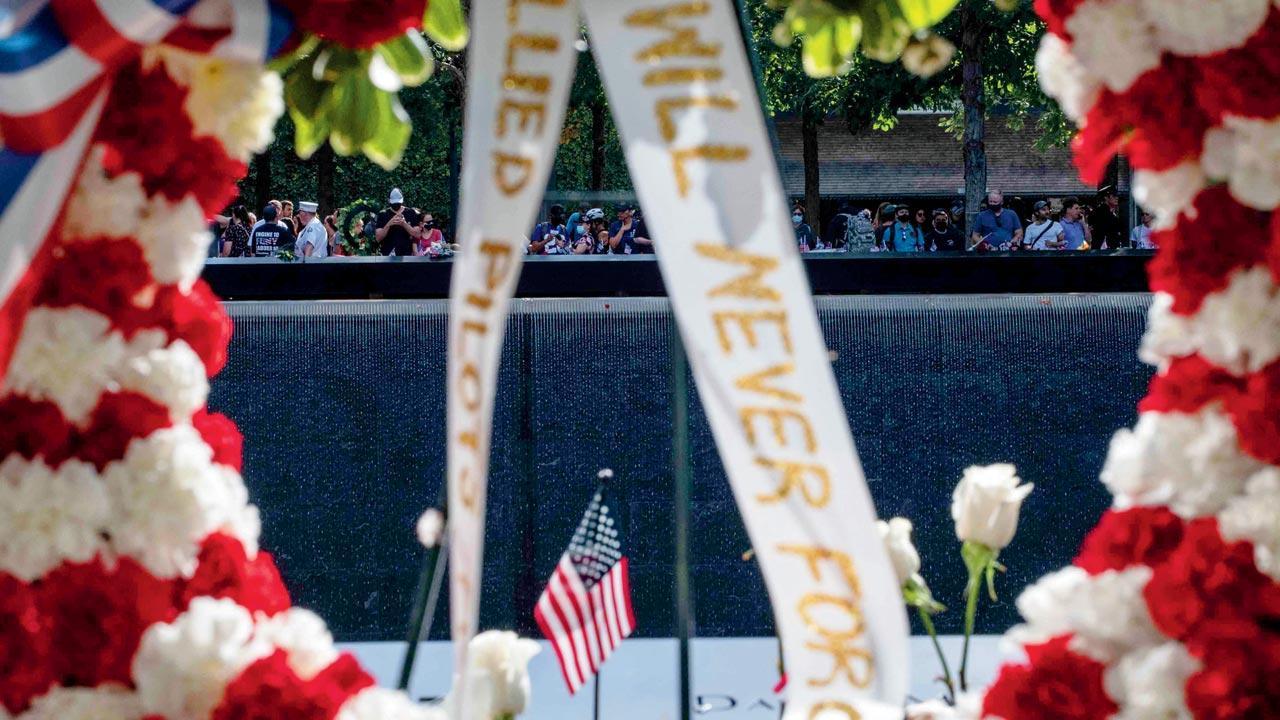It was neither the world’s first or its most catastrophic suicide terrorist attack. What makes it unforgettable to Americans is a mixture of ignorance and hubris

Visitors at the 9/11 Museum and Memorial during the commemoration of the 20th anniversary of the attacks on the World Trade Center, in New York, last week. Pic/AFP
On September 11, 2001, 2,977 people were killed and more than 6,000 others injured in the United States when two planes hijacked by 19 terrorists were crashed into New York’s World Trade Centre and the Pentagon. A few days ago, America marked the 20th anniversary of that day with reminiscences, analyses and op-eds. A whole generation had been born and reached adulthood since 9/11.
ADVERTISEMENT
Eight years earlier, on March 12, 1993, terrorists bombed 12 places in Bombay, as it was known then. Over 1,400 people were injured and 257 people died. It was the first time ever that 12 terrorist attacks had been perpetrated on a single city in a coordinated way within a few hours. But nothing happens in India on 3/12.
Mumbaikars go about their business as though it was just another day in paradise. There are no interviews with survivors, or poignant stories of loss and transformation. No one in the USA has any idea that 3/12 happened way before 9/11.
My question du jour is: what is so special about 9/11 that it has become a landmark in world history? It was neither the world’s first suicide terrorist attack nor its most catastrophic, though perhaps it was its most cinematic.
I remember watching it in Nairobi, baffled, astounded, watching America’s two tallest buildings with planes sticking out of them, smoke billowing out and chaos everywhere. There is no question that the terrorist attack was dramatic and theatrical, like a scene from an apocalyptic Hollywood movie. The firefighters who put their lives at risk would become frontline heroes, and their stories would be told and retold.
A day can go down in history as unforgettable because a large number of people died. Is 2,977 a large number? You could ask: compared to what? Compared to 257, Mumbai’s 2003 death toll, it certainly is.
However, it is smaller compared to 4,431, the number of American soldiers who died fighting for George W Bush’s misdirected war of revenge for 9/11 against Iraq, a country that had nothing to do with 9/11. In other words, more Americans died avenging 9/11 than during the terrorist attack itself.
As of January 2007, 500 US troops had been amputated. Toes and fingers were not counted.
It is also smaller than 4,127. That’s the number of Americans who had died till March this year from gun violence. Now we’re talking of Americans killing Americans with their own guns. However, this is only a 4-digit number. Let’s aim higher.
A considerably bigger number is 19,380, the number of Americans who killed each other with guns in 2020, even while a deadly pandemic raged over the world.
Shall we try for six digits? While hammering the wrong country in revenge, America caused the violent deaths of 6,01,027 Iraqis. Over 1.8 million Iraqis fled to other countries, and 1.6 million lost their homes within Iraq itself.
There are no memorials or wreaths to the millions, the tens of thousands, the thousands, the hundreds, or even the dozens of innocent bystanders killed as collateral damage at the hands of American guns, planes and drones.
What makes 9/11 such a hushed moment for a country with so much blood on its hands?
Ignorance and hubris. In my eyes, America is guilty of both. Its own swollen image of itself is as exceptional and unassailable. But few Americans know that the al Qaeda was nurtured with money funnelled to bin Laden from the CIA during a different war. In that conflict, to prevent Russia from taking over Afghanistan, the USA chose to fight by proxy, using Afghan jihadis (freedom fighters) whom it trained, armed and paid handsomely.
America sowed the seeds of 9/11 at that time. Afflicted with profound historical and cultural ignorance, the average American is aghast that anyone would dare strike the US so blatantly on its own soil—and succeed. But the country is the cause of the consequence.
If a memorial is erected, perhaps it should be to Ali Ismail Abbas, target of one of George W Bush’s precision strikes. He was 12, in his hovel in Baghdad with his five months pregnant mother, when there was the whistling sound of an American bomb headed towards them. The number of family members dead varies, the highest being 17 but the rough truth is that no one survived.
Except Ali. When they found him, he was a charred black child with 60% third-degree burns. One of his arms had melted into a twisted claw; the other arm had been burned off the elbow, leaving two protruding bones. Official photographs released after he had received prosthetic limbs—which he later rejected—show a boy with porcelain eyes, shocked numb, robbed of everything a child needs.
Here, viewed from there. C Y Gopinath, in Bangkok, throws unique light and shadows on Mumbai, the city that raised him. You can reach him at cygopi@gmail.com
Send your feedback to mailbag@mid-day.com
The views expressed in this column are the individual’s and don’t represent those of the paper
 Subscribe today by clicking the link and stay updated with the latest news!" Click here!
Subscribe today by clicking the link and stay updated with the latest news!" Click here!






